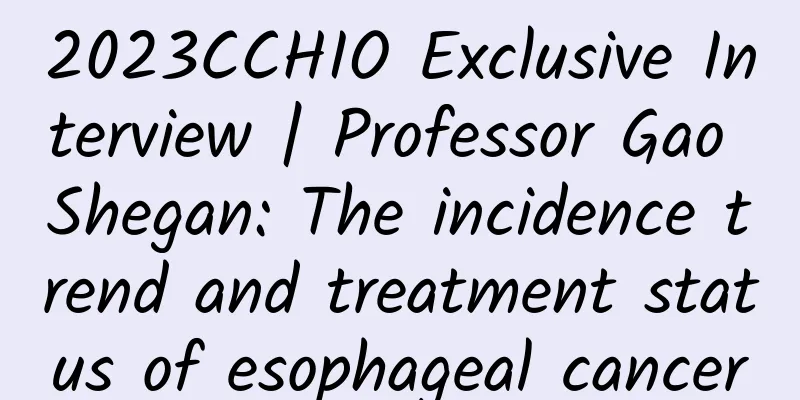2023CCHIO Exclusive Interview | Professor Gao Shegan: The incidence trend and treatment status of esophageal cancer

|
In the past few decades, the incidence of esophageal cancer has remained high worldwide. China, as a major country with esophageal cancer, accounts for half of the world's cases. So, what is the epidemic trend of esophageal cancer in my country? What are the emerging treatments? How to deal with adverse reactions? In this regard, Professor Gao Shegan from the First Affiliated Hospital of Henan University of Science and Technology shared his insights on the epidemiological trends, treatment principles, and current application status of immunotherapy for esophageal cancer. Professor Gao Shegan Doctor of Medicine, Professor with Doctoral Supervisor, Chief Physician, Expert with Special Allowance from the State Council President of the First Affiliated Hospital of Henan University of Science and Technology Editor-in-Chief of Esophageal Diseases and Esophageal Cancer Chairman of the Infectious Tumor Expert Committee of the Chinese Anti-Cancer Association Chairman of the Chinese Medical Doctor Association's Esophageal Cancer Expert Committee Chairman of the Esophageal Cancer Professional Committee of Henan Anti-Cancer Association Director of the Photodynamic Therapy Training Base for Esophageal Cancer of the Chinese Anti-Cancer Association Director of the sub-center of the National Key Laboratory for Esophageal Cancer Prevention and Treatment jointly established by the province and the ministry Director of Henan Provincial Key Laboratory of Microecology and Esophageal Cancer Prevention and Treatment Director of Henan Provincial International Joint Key Laboratory of Infection and Esophageal Cancer Published 176 research papers on esophageal cancer, 88 of which were indexed by SCI, 15 invention patents and 6 software copyrights. Excellent expert of Henan Province, outstanding talent of scientific and technological innovation of Henan Province, and leader of medical disciplines of Henan Province. Led the formulation of industry standards and expert consensus. Presided over the establishment of the early screening I-level prevention system for esophageal cancer. The overall incidence and mortality of esophageal cancer in my country are on a downward trend Professor Gao Shegan is a well-known oncology expert in China, with rich experience and in-depth research in the treatment and research of esophageal cancer. Regarding the epidemiological trends and reasons behind esophageal cancer, Professor Gao pointed out that there are great differences in the pathological types of esophageal cancer between my country and Western countries. Esophageal cancer in China is mainly esophageal squamous cell carcinoma (accounting for 90%~95%), while in Western countries, 60% of esophageal cancer is esophageal adenocarcinoma. Although the incidence and mortality of esophageal cancer in my country have increased significantly, after age standardization, the standardized incidence and mortality have shown a downward trend. This may be related to the launch of rural esophageal cancer screening and early diagnosis and treatment in my country, the increase in life expectancy, and changes in residents' living environment and lifestyle. By adjusting the intestinal microecology, tumors can be controlled to a certain extent. The intestinal microecology is closely related to the occurrence and development of tumors and tumor immunity, but is the oral microecology related to digestive tract tumors? Professor Gao Shegan said that the oral cavity is known as the second largest microbial habitat after the intestines, with more than 700 common bacteria distributed on the surface of teeth, inside the mouth, around the tongue, in oral secretions and saliva. Under normal circumstances, the oral microecology maintains a dynamic balance, but the buffering capacity of this dynamic balance is limited, and the action of some factors will break this dynamic balance. Microecological imbalance is related to a variety of oral infectious diseases, and is also related to tumors, such as oral cancer, gastric cancer, esophageal cancer, etc. For example, Helicobacter pylori and Porphyromonas gingivalis. The balance of oral microecology has an important impact on the health of the entire body, including the digestive system. The bacteria in the mouth can affect the digestion and absorption of food, and also affect the balance of intestinal microecology. If the oral microecology is unbalanced, it may lead to an imbalance in the intestinal microecology, thereby increasing the risk of digestive tract tumors. Therefore, maintaining the balance and health of the oral microecology is also one of the important measures to prevent digestive tract tumors. In addition to traditional esophageal cancer treatment, emerging methods such as immunotherapy are gaining popularity At present, the treatment principle of esophageal cancer advocates multidisciplinary treatment (MDT). Professor Gao Shegan explained that, from a general perspective, the treatment of esophageal cancer is mainly divided into surgery, radiotherapy, chemotherapy, targeted therapy and immunotherapy, and also includes supportive treatments such as nutrition, analgesia, and exercise rehabilitation. For early T1a esophageal cancer, endoscopic resection can achieve cure. For early T1b-2 esophageal cancer, surgery is generally performed directly; for cervical esophageal cancer, radical chemoradiotherapy is feasible. For patients without distant metastasis, but with deep local invasion, reaching T3 or T4, or with positive lymph nodes, chemoradiotherapy (neoadjuvant chemotherapy or neoadjuvant chemoradiotherapy) is recommended first, followed by surgery. As more and more immunotherapy drugs are approved, researchers have begun to try to combine preoperative neoadjuvant radiotherapy/chemotherapy with immunotherapy. Professor Gao Shegan pointed out that the application of immunotherapy in esophageal cancer originated in 2019, when immunotherapy drugs were approved as second-line treatments for advanced esophageal cancer, ushering in a new era of immunotherapy for esophageal cancer. As of today, domestic and international guidelines recommend that chemotherapy combined with immunotherapy be the first-line treatment for advanced esophageal cancer. Professor Gao Shegan said that more and more studies are pushing immunotherapy forward, including perioperative, preoperative neoadjuvant chemoradiotherapy combined with immunotherapy, postoperative adjuvant immunotherapy, etc. He believes that the results of these studies in the future will bring greater survival benefits to patients. For immune-related adverse reactions, appropriate treatment should be given according to the reaction classification. Some adverse reactions may occur after immunotherapy. Professor Gao Shegan reminds patients that if adverse reactions occur after using immunotherapy, they should communicate with their doctors in time and take appropriate measures according to the grade of the reaction. Generally, grade 1 immune-related adverse reactions do not require immediate discontinuation of the drug, but appropriate symptomatic treatment is required; grade 2 generally requires discontinuation of the drug and treatment with cortisol. Severe adverse reactions such as myocarditis can also be life-threatening. It is recommended to fully understand the drug before immunotherapy, and to detect and treat it in a timely manner. In short, through Professor Gao Shegan's sharing of the current status and future trends of esophageal cancer treatment, we have seen the efforts and achievements of oncologists in this field. We look forward to more innovations and breakthroughs in the future to bring better treatment options and quality of life to esophageal cancer patients. |
>>: Traditional Chinese Medicine Scraping Technique
Recommend
What to drink when weaning to reduce milk production
Weaning is a painful thing for pregnant women, an...
What to do if you have breast milk when you are pregnant
We know that milk is secreted to feed the baby. G...
Will postpartum anemia lead to insufficient milk supply?
How to recuperate after giving birth to a weak bo...
Left side abdominal pain in late pregnancy
For an expectant mother, the period of pregnancy ...
How to tighten your private parts and stop them from getting loose
The health of women's private parts should be...
How about ultrasound examination of ovarian cysts?
According to statistics, many people in the count...
What disease should I be afraid of if I have pink vaginal discharge during pregnancy?
During pregnancy, if the leucorrhea changes color...
Will ovulation still occur after vasectomy?
In daily life, there are many methods of contrace...
Is 25 normal for women?
The basic sedimentation rate of blood cells, comm...
What causes lower back pain and increased vaginal discharge?
It is normal for women to have leucorrhea. In fac...
Can I have an abortion at 9 weeks of pregnancy?
Abortion brings great harm to women, and frequent...
What are the solutions for diseases caused by confinement?
As we all know, there are many taboos for women d...
Will menstruation still occur during perimenopause?
Perimenopause does not mean menopause, that is to...
What are the main treatments of Kangfu Anti-inflammatory Suppositories?
As the name suggests, Kangfu Anti-inflammatory Su...









